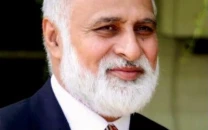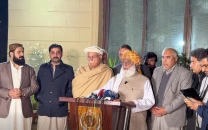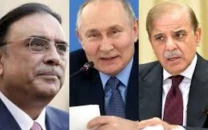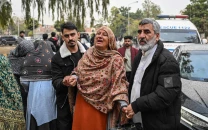Pakistan’s break-up conspiracy
We Pakistanis are quite capable of dismembering our country without any foreign help.

I cannot speak for the US or the UK governments, but let me assure you, we Pakistanis are quite capable of dismembering our country without any foreign help. However much we might be important for US President Barack Obama, lowering unemployment in the US, for example, is more of Obama’s priority than a dismembered Pakistan.
Further, and sadly, this is not fairly obvious to everyone; the plan for the break-up of Pakistan is ridiculous — even for the most diehard right-wing people currently in the US or UK administrations. First, let us remember that the only time Pakistan has split, in 1971, was completely due to the attitudes and actions of the Pakistani government. Granted that India helped the East Pakistanis in their struggle, but that was at a very late stage and did not play a major part in forming the separatist movement. Let us also not forget that after the December 16, 1971 surrender, Pakistan was at its lowest ebb and India could have easily instigated the break-up of West Pakistan — but it did not.
Why? The answer was the same in 1971 as is now. Pakistan is problematic as a united country, but its areas will be more unsustainable if the country breaks up. Contrary to some opinion, in 1947-8, the US and UK governments tried their best to shore up Pakistan. When the princely states (like Kalat) attempted to remain independent, it was the UK Foreign Office and the US State Department that not only refused to formally recognise the independence of the princely states, but also put pressure on several Arab states to refrain from recognising them. The UK government even refused to speak to a Kalat delegation hoping to buy arms and supplies, months before it became a part of Pakistan, and actually told them to channel their requests through Karachi. Similarly, both the US and the UK administrations helped the Pakistan government counter the Pathanistan propaganda from 1947-8 onwards, through intelligence sharing, arms supplies and training. So to think that the governments, who did so much to support such a shaky government in the past, are now plotting to dismember the country is rather ahistorical.
Secondly, disintegration of Pakistan will help no one. The US and the UK are concerned, foremost, about Pakistan’s nuclear assets. In a breakdown scenario, in whose hands these nuclear assets will remain, will be unclear especially considering the civil, and possibly armed, strife which will prefigure a possible break-up. Also, the establishment of an independent Balochistan, which will be inherently poor and unstable, will further exacerbate the instability of the region and hinder peace. With Afghanistan already an enormous problem, the amalgamation of the Pakhtun areas of Pakistan with that country, or the establishment of a separate Pakhtunistan, will only aggravate the already volatile situation.
The map of the region after the break-up shown by Altaf Hussain on September 9, and others, is also rather interesting. It is as if someone pulled out a map from the 1840s. In the 1840s the extent of the British Raj was almost exactly along the Sindh-Punjab border (with a few districts on the Frontier), most Pakhtun areas were under the vague suzerainty of Kabul and Kalat (present-day Balochistan) was effectively an independent country. Almost half a century of invasions, treaties and efforts by the British Raj brought the areas, which now constitute Pakistan, under its control mainly due to security concerns.
The security concerns of the 1840s which necessitated the consolidation of the western frontier of the Raj are still evident and demand the same approach. The break-up of Pakistan is not in the interests of either Washington or London — they have had enough opportunities to dismember the country — or even Delhi — which has shirked from doing so, at least, once. If Pakistan ever breaks up, it will be our own handiwork and not the result of imagined machinations in some foreign capital.
Published in The Express Tribune, September 13th, 2011.



















COMMENTS
Comments are moderated and generally will be posted if they are on-topic and not abusive.
For more information, please see our Comments FAQ